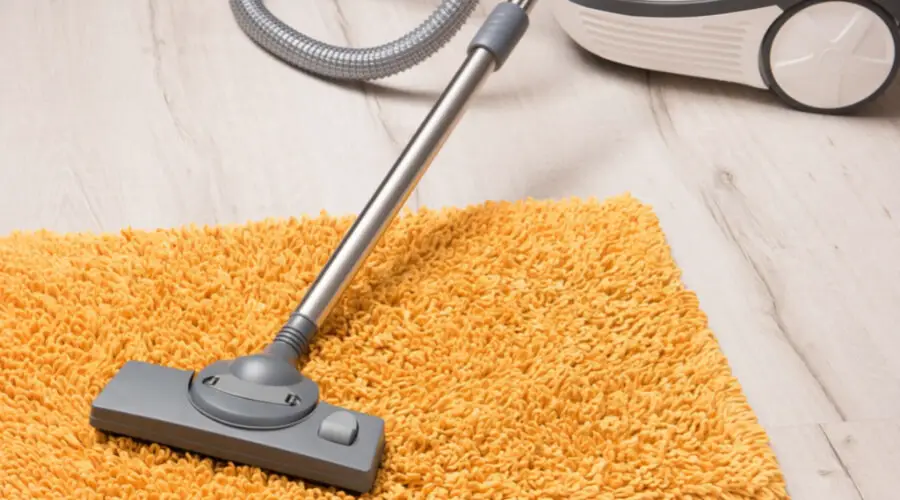Last Updated on July 22, 2023 By Emma W. Thomas
California rental laws on carpet cleaning and charges state that the landlord is responsible for carpet cleaning charges. They should not charge tenants for it. Some make the mistake of deducting from their tenant’s security deposit or charging them during their lease.
Who Should Cater For Carpet Cleaning Charges Per The California Rental Laws?

The person who is accountable for carpet cleaning costs varies from state to state, depending on the governing rental laws. The landlord is responsible for these charges in California except for special occasions such as when the carpet has undergone excess damage and dirt such as oil spills. They determine unusual damages and dirt by considering the time it will take for the cleaning professional to clear dirt and the related cost. From there, the landlord can decide whether to ask for extra carpet cleaning charges from the tenant or not.
California rental laws on carpet cleaning charges are there to protect tenants from greedy landlords. Some come up with excessive carpet cleaning costs with the aim of extortion. That is why the laws state that before moving in, a tenant should have precise details on the landlord’s expectations on the carpet before move-out. A tenant must leave the carpet in its original condition unless the lease agreement states otherwise.
When Should The Landlord Charge The Tenant For Carpet Cleaning In California?

There are special incidences when the landlord can charge for carpet cleaning from the tenant. It is only under the following cases they are allowed to do so as stated by California rental laws:
When The Lease Agreement Allows
Some landlords have their lease agreements stating that it is upon the tenant to cater for carpet cleaning charges. In such a case, the tenant has no alternative provided they signed the lease agreement.
A tenant is responsible for hiring professional carpet cleaners before leaving their rented space in such a scenario. Failure to do so, California law allows the landlord to withhold a standard cleaning fee from the tenant’s bond. Alternatively, they could find another way to recoup the carpet cost.
When The Carpet Is Excessively Damaged
It is usual for a carpet or other furniture to undergo normal wear and tear when living in a rented space. However, some damages are beyond “ordinary” wear and tear. An example of such unusual damage includes oil stains, paint, pets’ urine, and other serious blemishes, which require a longer cleaning period by professional cleaners.
Such stains also require extra charges making it only fair for the landlord to ask for additional cleaning charges from their tenant. Tenants should only pay for these charges upon receiving a copy of the itemized cleaning charges.
Poor Carpet Cleaning When The Tenant Is Moving Out
Tenants must leave their rented space in its original condition as stated by California rental laws. They should abide by the law and leave the rented space, including the carpet, in its original state. Failing to do so could result in the landlord withholding some of their security deposit to serve as carpet cleaning charges.
What Can A Tenant Do if their Landlord is Trying to Make Them Pay for Routine Carpet Cleaning?
If a tenant’s landlord is trying to make them pay for routine carpet cleaning, the tenant can take the following steps:
- Review the Lease Agreement: Carefully read the lease agreement to understand the terms related to cleaning responsibilities and deductions from the security deposit.
- Check State Laws: Research local tenant laws and regulations, as some states have specific rules regarding the use of security deposits and cleaning charges.
- Communicate with the Landlord: Discuss the issue with the landlord and politely point out that routine carpet cleaning is not the tenant’s responsibility as per the lease or state laws.
- Document Everything: Keep records of communication with the landlord, including emails, letters, or texts, to have evidence of discussions regarding the cleaning charges.
- Know Tenant Rights: Familiarize yourself with tenant rights in your area, including the rules on security deposits and landlord responsibilities for maintenance and repairs.
- Mediation or Arbitration: If the issue remains unresolved, consider mediation or arbitration as a way to settle the dispute without going to court.
- Legal Advice: Consult with a tenant rights attorney to understand your legal options and seek guidance on how to proceed.
- Small Claims Court: As a last resort, if the landlord continues to wrongfully demand payment, tenants may consider filing a claim in small claims court to recover wrongfully withheld amounts.
Why Can Leases Include Charges for Routine Carpet Cleaning?
Leases can include charges for routine carpet cleaning for several reasons:
- Maintaining cleanliness: One of the primary reasons leases include charges for routine carpet cleaning is to ensure that the rental property remains clean and hygienic. Carpets tend to accumulate dust, allergens, and stains over time, especially in high-traffic areas. Regular cleaning helps maintain a healthy living environment for tenants.
- Preservation of the carpet: Routine cleaning not only keeps the carpet clean but also helps preserve its lifespan. Dirt, debris, and stains can cause permanent damage to carpets if left untreated for extended periods. By incorporating carpet cleaning charges in leases, landlords can ensure that tenants take responsibility for maintaining the carpet’s condition.
- Professional expertise: Carpet cleaning is a specialized task that often requires professional expertise and equipment. By including charges for routine carpet cleaning in leases, landlords can hire professional cleaners when necessary. Professionals ensure thorough cleaning, removing deep-seated dirt, and enhancing the overall appearance of the carpet.
- Financial responsibility: Incorporating carpet cleaning charges in leases establishes the financial responsibility of tenants for maintaining the rental property. Tenants are expected to keep the property clean and in good condition, which includes regular carpet cleaning. By making it a part of the lease agreement, landlords can enforce this responsibility and avoid disputes regarding carpet maintenance.
- Fairness among tenants: Including carpet cleaning charges in leases ensures fairness among tenants. If one tenant neglects to clean the carpet during their tenancy, the next tenant may face the consequences of living in an unclean environment. By spreading the cost of routine carpet cleaning across all tenants, the burden is shared equally, promoting a fair and consistent approach to maintaining the property.
- Enhanced marketability: Well-maintained rental properties with clean carpets are more attractive to prospective tenants. By ensuring routine carpet cleaning through lease agreements, landlords can enhance the marketability of their rental units. Clean and fresh carpets contribute to a positive first impression, making the property more appealing and increasing the likelihood of attracting quality tenants.
- Time-efficient for tenants: Including charges for routine carpet cleaning can save tenants time and effort. Instead of having to research, rent equipment, and clean the carpets themselves, tenants can rely on professional cleaners to handle the task. This convenience often outweighs the costs associated with the service, making it a worthwhile inclusion in the lease agreement.
What Are The Responsibilities Of Landlords Per California Rental Laws?
Everyone wishes to move into freshly cleaned and new rental space without nasty carpets and moldy furniture and appliances. Therefore, it is important for anyone, before signing a lease agreement, to verify and ensure that the landlord will have the rental space cleaned before occupancy to prevent future disagreements during move-out. Some of the responsibilities set for landlords by California rental laws include;
Provision Of A Conducive Living Space.
California laws state that a rental space must meet all local and state building and health codes to be considered habitable. These codes include proper plumbing providing hot and cold water, electric systems, working gas, operational smoke detectors, heat systems, and good weatherproof roofs and walls. A livable rental space should also have a clear and safe emergency exit with no harmful conditions like toxic fumes. Some appliances like carpets and luxury appliances are only applicable when they affect the tenant’s health and well-being.
Customizing Rental Spaces And Charges
The lack of a refrigerator, washing machine, or dishwasher does not make a rental property inhabitable. It is upon the landlord to come up with extra charges for customization when they provide such appliances to their tenants. They can do this by coming up with precise lease agreements, including the repair charges during and after the lease. Tenants should carefully review the lease agreement before signing and moving in, especially replacing and repairing the provided appliances.
Setting And Collecting Security Deposits.
Some rental spaces come with all household appliances, and like any other item, they are prone to wear and tear. For this reason, California rental laws state that landlords must come up with a set security deposit. From that security deposit, they can deduct any incurred costs for damages or replacement of any appliance. However, it is against California laws for a landlord to charge the full price of an appliance from a security deposit.
They should consider the age of the item, which is pro-rated against its average life, to come up with what to charge the tenant. For example, if a tenant occupies a rental space with an 8-year-old carpet, a landlord should pro-rate its cost for the remaining two years to end its useful life.
Considering The Useful Life Span Of Items And Appliances.
All items and appliances have their useful life span, including carpets used in rental houses. The landlord is responsible for replacing appliances that have reached their useful life span, which leads to normal wear and tear. For example, under California rental laws guidelines, a carpet’s useful life span is ten years. After ten years, a landlord must replace the carpet if the tenant has not caused abnormal damage to it.
When Does California Law Restrict Landlords From Charging Tenants For Carpet Cleaning?
There are some special cases in which landlords can ask for carpet cleaning charges from tenants. There are also incidences in which California laws barns them from doing so. For instance, they are not allowed to charge their tenants for standard cleaning. Professional carpet cleaners use standard cleaning charges by considering the amount of energy and time spent during cleaning. Some landlords may take advantage of their tenants to ask for an amount higher than the standard cleaning charge.
California rental laws consider basic carpet cleaning as part of normal wear and tear hence prohibiting landlords from withholding tenants’ security deposit in such an incidence.
Provided the carpet does not exceed normal cleaning rates as per professional cleaners, it has normal damage. A tenant should not pay for any cleaning or repair charges that require the landlord to bear all cleaning costs.
What Are The Similarities Between California And San Francisco Rental Laws On Carpet Cleaning Charges?
Rental laws on carpet cleaning and costs differ from state to state. There have been endless disputes between tenants and landlords whose responsibility is to clean the carpet during moving out. San Francisco and California laws on this issue share some similarities. They include;
- In both states, landlords are responsible for carpet cleaning charges. They are also responsible for replacing it upon reaching the end of its useful life span.
- Both states check whether the carpet under consideration has damages due to normal wear and tear or excess dirt and damage. They do this using professional carpet cleaners’ standard charging rates. It usually occurs when there is a dispute between a tenant and a landlord on who to take the cleaning charges responsibility.
- During move-out, tenants should leave carpets in their original condition as they found them during their move-in, except in cases of normal wear and tear.
- The law states that tenants should cater cleaning charges if the carpet undergoes abnormal wear and tear in both states. The tenant’s negligence in not cleaning and maintaining the carpet during their lease is against the law, and they should pay for any extra costs incurred.
How Long Should A Carpet Stay In A Rental Property According To California Rental Laws?
According to California rental laws on carpet cleaning and charges, a standard quality carpet should stay for ten years. It undergoes normal wear and tear during this period, provided the tenant does not damage it. After ten years, landlords should replace the carpets as they have served their useful life span.
If the carpets have spills of oils or holes from trod of broken glass pieces after this period, tenants pay for those damages. Low-standard carpets have a lower useful life span which ranges between 3-5 years.
Conclusion
California rental laws state that the landlord is in charge of carpet cleaning and replacing charges and should not ask anything from the tenant. Some incidences require the tenant to incur cleaning costs, such as when the carpet has excessive damage, which is beyond the normal wear and tear.
References:
https://www.tenantresourcecenter.org/carpet_cleaning
https://www.doorloop.com/blog/landlords-charge-tenants-carpet-cleaning-damages
Emma is a graduate of Domestic Science or Family and Consumer Sciences (Home Economics) from the University of Wisconsin. She has 7 years of experience Working with the strategic section of BestBuy and now writing full-time for Homeeon.
From Managing the Home, Interiors, Cleaning, and Exteriors to Gardening and everything about Making A Home Liveable – is her passion and this Homeeon is the result of this.
Emma loves decorating her home with the best stuff found online. She cares about quality over anything and writes reviews about them here in Homeeon. Get in touch with her over Pinterest.
Keep reading her blogs.

